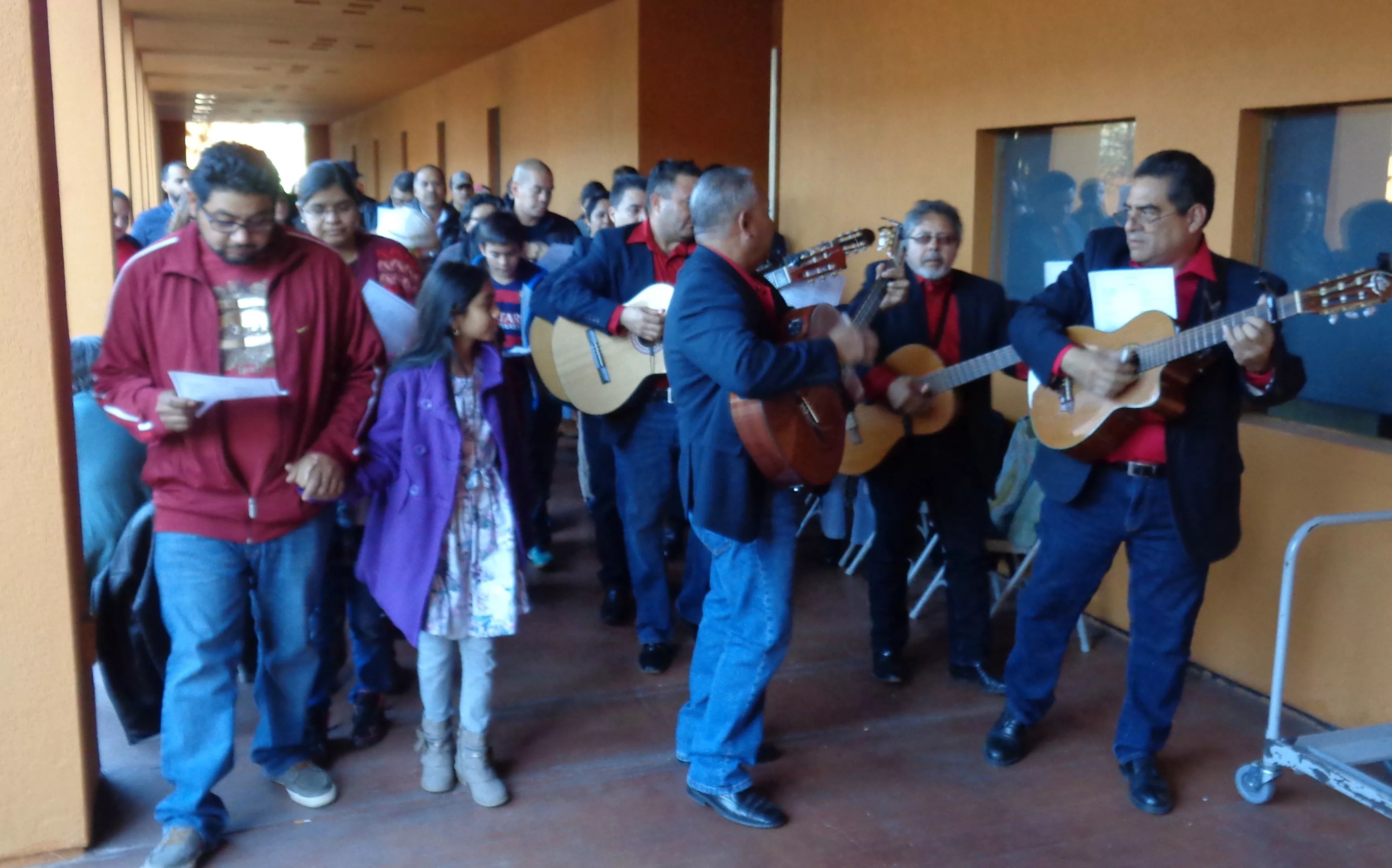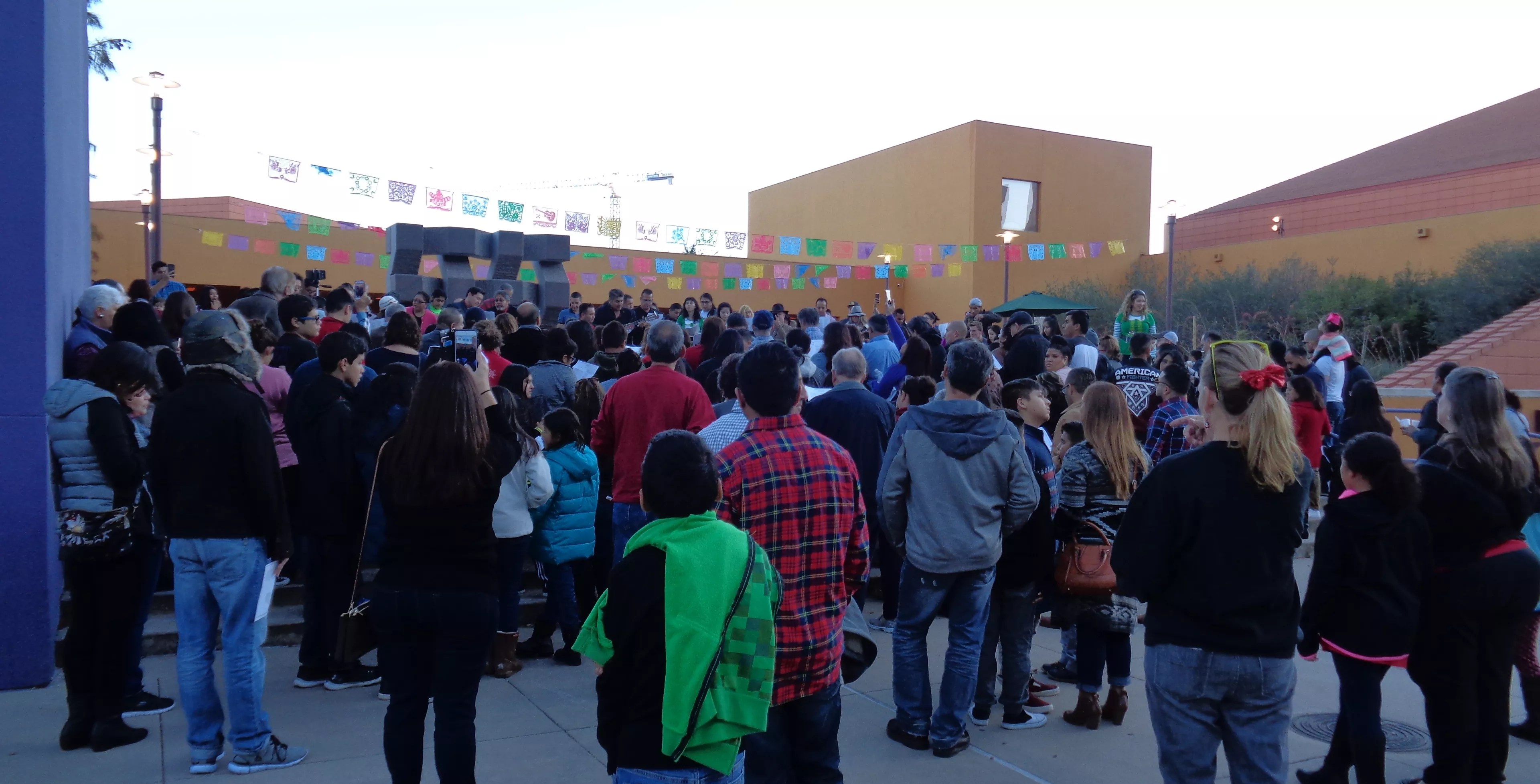
Roberto Jos

Audio By Carbonatix
In Latin American and especially Mexican culture, posadas (meaning “inn” in English) are an annual holiday celebration re-enacting Mary and Joseph’s journey from Nazareth to Bethlehem, where they sought refuge to give birth to Jesus.
Usually at homes or churches, posadas traditionally occur during the nine days leading up to Christmas Eve. The size of these celebrations varies from fewer than 10 to hundreds of participants. Regardless, the posada centers on a procession that travels to prearranged houses while singing traditional Spanish songs that ask for shelter.
Some posadas take place at night, with candles illuminating the singing faces. For other processions, participants dress as shepherds. All posadas help to keep cultural traditions alive.
The Latino Cultural Center hosted its 10th annual posada celebration Sunday. Led by the Rondalla Romantica de Dallas – a nine-man string musical group – the procession circled around the center’s building on the corner of Good-Latimer Expressway and Live Oak Street.
At every stop, attendants sang Spanish posada songs. Those who’ve attended posadas for decades have them memorized. Those new to the tradition read from lyric sheets. The procession concluded in the center’s plaza, where the Rondalla played more festive Spanish songs that inspired a few children and couples to dance.
“I think for all of us, it’s very important to remember that these are cultural traditions,” said Benjamin Espino, the center’s general manager.
There was also a lot of Mexican food at the celebration. A food stand outside the center sold tamales, tacos and elotes. Inside, volunteers and employees gave out hot chocolate and pan dulce (Mexican sweetbreads), and children received free toys and posed for pictures with Santa Claus.
Horetencia Rubalcava, the Latino Cultural Center’s program coordinator, said many families and older people participate to continue the tradition.
The Latino Cultural Center, which opened in 2003, hosts more than 300 cultural events per year. These include youth and senior programs, art exhibits, plays, community nights filled with music and dancing, and the upcoming Cine de Oro series, which will screen Latino films once a month.

Approximately 1,000 people attended the posada celebration at the Latino Cultural Center on Sunday.
Roberto Jos
“The cultural center provides a much-needed service to the community,” Espino said.
The weather was mild Sunday, and he expected about 1,000 people during the course of the 3.5-hour posada celebration. The Latino Cultural Center, a division of Dallas’ Office of Cultural Affairs, took advantage of the large turnout by encouraging attendants to fill out demographic questionnaires that asked about their education, race and ethnicity. Espino said the study is an important part of crafting the 2018 Dallas Cultural Plan, which will determined how Dallas funds cultural projects throughout the city.
“As a city, we are doing a cultural plan this year, so it’s very important to capture demographic information as to what our citizens would like in arts and culture,” he said.
After the Rondalla, Mariachi Sol Azteca continued the celebration. The high school mariachis from the Grand Prairie Fine Arts Academy had played at the Latino Cultural Center’s posada celebration before.
“We like playing at the Latino Cultural Center. It’s a good place to play,” mariachi director Marta Ocampo said. “The people are always very good to my group; they’re excited about seeing them.”
Matachines from Our Lady of Lourdes Catholic Church were the final surprise. Matachines are colorfully dressed dancers who symbolize the mixture of cultures that make up Latin America. These dances have been performed for centuries in some parts of Mexico.
No two posadas are the same. But when done correctly, posadas all evoke a sense of community, pride, culture and tradition.
The Latino Cultural Center’s posada accomplished each of these Sunday, which is why it attracts families each year. There are always new people and familiar faces eager to join the holiday celebrations to sing, eat, dance and laugh.
“We see some kids who’ve actually grown up with the posada festival, which is amazing,” Espino said.